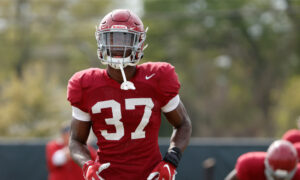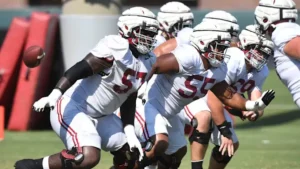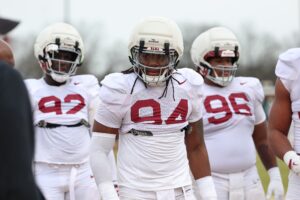
Illinois swingman Nick Anderson (1987-89)…
Nick Anderson, a name that resonates deeply with Illinois basketball enthusiasts, was a key player in shaping the University of Illinois’ basketball program during his time with the team from 1987 to 1989. His journey as a swingman, the versatile player who can perform both on the perimeter and inside, was crucial in establishing his legacy in college basketball. Though his college career was brief, his impact was substantial, and his trajectory after Illinois also garnered attention. Let’s delve into the life and basketball career of Nick Anderson, specifically focusing on his time as a swingman at Illinois between 1987 and 1989.
Early Life and High School Career
Nick Anderson was born on January 20, 1968, in Chicago, Illinois. Growing up in the heart of the city, Anderson was exposed to basketball at a young age. The city of Chicago has long been known for producing basketball talent, and Anderson was no exception. He attended Simeon Career Academy in Chicago, where he quickly became a standout player. Simeon, a powerhouse in Chicago basketball, helped shape Anderson’s basketball skills and work ethic.
As a high school player, Anderson was a versatile guard-forward, traits that would serve him well later in his college and professional career. During his time at Simeon, Anderson earned several accolades, which included All-State honors, and his performances caught the attention of college scouts from across the country. At 6’6” with a strong build and a skill set that allowed him to play multiple positions, Anderson stood out as a promising talent.
Arrival at the University of Illinois
In 1987, Nick Anderson made his decision to attend the University of Illinois, joining a program that was on the rise under head coach Lou Henson. The Illinois Fighting Illini basketball program had experienced success throughout the 1980s, and Anderson’s commitment was seen as a major coup for the team. He joined an already talented roster, but his unique skill set as a swingman—able to play both shooting guard and small forward—offered Illinois the kind of versatility that would make them competitive in the Big Ten Conference.
Playing Style: The Swingman Role
Nick Anderson’s position as a swingman at Illinois allowed him to contribute in various ways on both ends of the floor. His role was central to the success of the Illini during his tenure, even though his time at the school was relatively short. Anderson was a player who could both score and defend at multiple positions, making him an invaluable asset to the team.
As a swingman, Anderson’s offensive game was multifaceted. He was a capable scorer from beyond the three-point line, and his mid-range jump shot was one of the key components of his game. But Anderson wasn’t merely a perimeter shooter. He had the size and athleticism to attack the basket, and he often used his physicality to finish around the rim. His ability to drive the ball to the hoop, combined with his outside shooting, made him a matchup nightmare for opposing defenders.
Defensively, Anderson was just as valuable. His length and quickness allowed him to guard multiple positions, from the opposing team’s shooting guard to their small forward or even power forward. This versatility on the defensive end was a key factor in making Anderson so effective as a swingman. His ability to disrupt passing lanes and make plays on defense helped the Illini become a well-rounded team under Coach Henson.
The 1987-1988 Season: The First Year
In his freshman season (1987-88), Nick Anderson immediately made an impact for the Illinois Fighting Illini. Illinois entered the season as a team with high expectations, and Anderson was seen as one of the players who could help elevate them to a higher level. As a freshman, Anderson showed that he could play with some of the best players in the Big Ten. His combination of scoring, defense, and basketball IQ made him an important part of the team.
During his first season at Illinois, Anderson averaged 11.7 points per game, an impressive number for a freshman. He also contributed in other areas, averaging 4.2 rebounds and 1.4 assists per game. His shooting percentages were solid, hitting 46.7% of his field goals and 34.7% from three-point range. While Illinois did not reach the pinnacle of success that year, the team finished with a respectable 18-13 record, and Anderson’s performances were one of the bright spots of the season.
The 1988-1989 Season: A Breakout Year
Nick Anderson’s sophomore season in 1988-89 saw him take his game to another level. He became one of the key players on an Illinois team that was poised for a deep run in the NCAA Tournament. During this season, Anderson’s scoring ability became even more evident, and he began to show why he was one of the top swingmen in college basketball.
He averaged 17.2 points per game in his second season, more than five points higher than the previous year. His shooting efficiency also improved, as he hit 48.1% of his field goals and 35.5% of his three-point attempts. Anderson’s improvement as a scorer helped Illinois finish with a 22-9 record, earning an at-large bid to the NCAA Tournament.
In the NCAA Tournament, Illinois advanced to the Sweet 16 before being eliminated by Seton Hall. While the team did not reach its ultimate goal of a Final Four appearance, Anderson’s play was a key part of their success. His ability to score in multiple ways and defend at a high level made him a key player for the Illini throughout the season.
Departure from Illinois and NBA Draft
Following the 1988-89 season, Nick Anderson made the decision to declare for the NBA Draft, forgoing his final two years of eligibility. His decision to leave Illinois early came as little surprise to those who had followed his college career, as Anderson had shown the talent and potential to play at the professional level. By the end of his sophomore season, Anderson was already regarded as one of the best swingmen in college basketball.
In the 1989 NBA Draft, Nick Anderson was selected by the Orlando Magic with the 11th overall pick. His selection was a testament to his versatility and potential to be a key contributor at the next level. Anderson’s college career at Illinois may have been short, but it had been highly successful, and his professional career would go on to add to his legacy.
Legacy at Illinois
Though Nick Anderson only spent two seasons at Illinois, his impact on the program was undeniable. His time as a swingman for the Illini helped solidify the program’s reputation as one of the top teams in the Big Ten during the late 1980s. Anderson’s scoring ability, versatility, and leadership on the court were key components of Illinois’ success during his time there.
Anderson is remembered as one of the most dynamic players in Illinois basketball history, and his brief but impactful time with the Illini helped set the stage for future success. His time at Illinois, especially during the 1988-89 season, remains a significant part of the program’s storied history.
Nick Anderson’s two years at Illinois may seem short in the grand scheme of things, but his legacy as a swingman for the Fighting Illini is lasting. He was a player who could do it all—score, defend, and lead on the court. His versatility as a swingman made him one of the most exciting players in college basketball during his time at Illinois. While his professional career with the Orlando Magic and beyond took him to new heights, his time with the Fighting Illini remains an important chapter in the history of Illinois basketball.
Though he would go on to play in the NBA and enjoy a successful career, it was his college years, especially as a dynamic swingman for Illinois, that first showcased his talents to the world. Nick Anderson’s journey through Illinois basketball was not just one of individual success, but also a key part of the team’s collective growth. The memories of his time at Illinois still live on, and his story continues to inspire future generations of basketball players.





